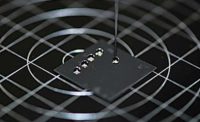SYDNEY, Australia-Researchers at the University of New South Wales (UNSW) are using nanotechnology to develop coatings they hope will be used for self-cleaning surfaces in hospitals and the home.
Led by professors Rose Amals and Michael Brungs, a team at the university's ARC Center for Functional Nanomaterials is studying tiny particles of titanium dioxide that work by absorbing ultraviolet light below a certain wavelength that gives the particles an oxidizing quality stronger than any commercial bleach.
These nanoparticles can kill microbes and break down organic compounds. Because surfaces coated with titanium dioxide are superhydrophilic, any water poured on the surface runs straight off, washing as it goes.
Currently, titanium dioxide can only be activated by sunlight. But the UNSW team is working on ways to activate titanium dioxide with indoor light. Specifically, the team is modifying the nanoparticles with elements such as iron and nitrogen so they can absorb light at longer wavelengths.
